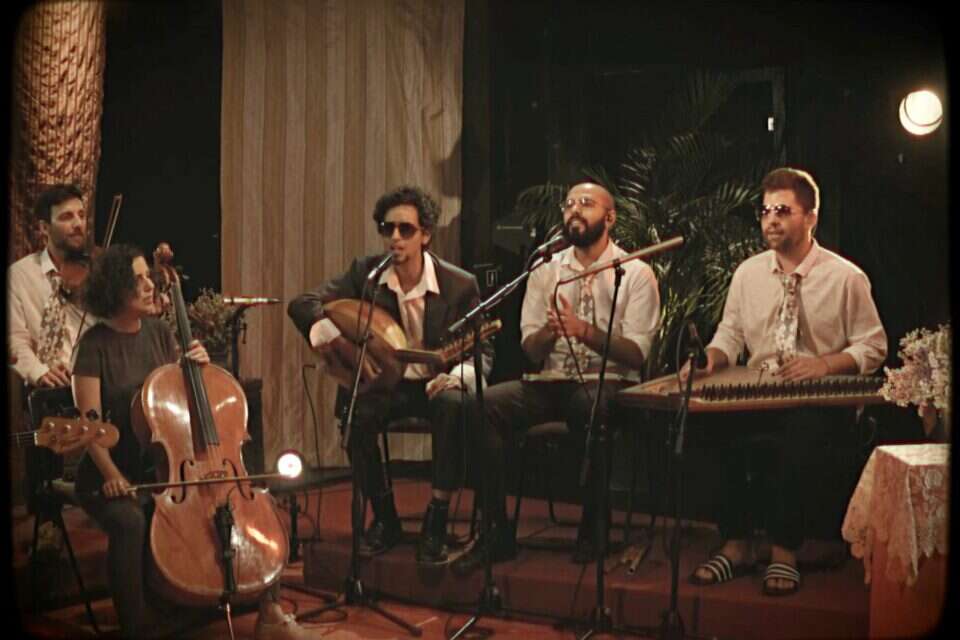This interview is conducted by Eyal Wahab from Berlin, night after night in which he appeared in the city together with his uncle Tessa and the Kuwaitis.
Tessa's name and the project of returning to his Iraqi roots were also destined to come up during the conversation, since Wahab also brings together the traditional and the contemporary, the eastern and the western in his work.
The Alka'at band he founded is a product of his desire to explore the Yemeni culture he comes from, and fuse it together with the musical influences he experienced as a teenager growing up in the 90s.
But to the "Tima" festival, commemorating 140 years of aliyah and settlement of Yemeni Jewry in Jerusalem, he comes with the Yemeni orchestra.
A show that, as its name implies - is based entirely on the purity of the music he heard at home (free from the influences of David Bowie, let's say), and to which he returned as part of the process of discovering his personal and musical identity.
"In general, there was some Yemenite music at home, but it was not that dominant," he explains the connection to the sources.
"I can say that over the years, as I grew older, the feeling of lack of identity and belonging grew stronger. Of course, I also grew up on the Dores, Led Zeppelin, Queen, Guns N' Roses and Nirvana, and it remains. I don't ignore it, but it was necessary for me to complete those for To keep getting up in the morning. Because being a voice is not enough. And in the new show (which will be performed at the festival on Friday) we are giving all the attention to the classical Yemeni folk music of the past."
Eyal Wahab.
"Preserving the tradition", photo: Donia Opalko
"This is a show that really preserves the tradition as it is, orchestras of the 1950s and 1960s in South Yemen. We are very excited to host a singer like Bracha Cohen in a show. This woman is 84 and a half years old, she has been performing almost every night for 60 years, and now she is with us We are also hosting Elram Amram, the son of Aharon Amram (brother of the musician Liron Amram, AP), and we will sing songs by Shalom Zabri.
Legends that are not in the mainstream, but are responsible for a lot of musical influences.
There is something important here."
There are those who would say that the Yemeni tradition actually gained representation in Israel, even in the world. Shoshana Demari, Ofra Haza.
"These are very talented representatives, but I'm talking about an orchestra. It's not a talent that knows how to sing and was taken by all kinds of music producers. I love Ofra and Shoshana, and all the people who brought this music out and exposed it to the world. You can't hide it, and it's great That they were connected to themselves and were not ashamed to release this music, even though in order to be accepted in society, the songs had some western arrangements."
An interesting process has been happening here for several years. Artists like you, like Dodo, A-WA, Liron Amram and Liraz Charchi are reclaiming the culture they came from. Why do you think you are the generation that did it?
"Neta Elkayam also does this with Moroccan music. I spoke with the violinist Elad Levy, who maintains the tradition with the Moroccan violin, about connecting to identity, to the roots, to who we are, to the place we came from, which is the closest and really strengthens you. No country slogans. Do Israeli music just because we grew up in Israel? I'm not sure about that.
"I think that the first generation, the one that immigrated to Israel, was concerned with surviving this thing and feeling that they belonged to something. The second generation faced wars, they didn't have time to deal with these things. It seems to me that the third generation woke up because everything became obvious. I empathize with a lot of my friends who experience what I experience, which is a feeling of not belonging to the land, to the country. I am neither left-wing nor right-wing and I have no interest in these things at all, but there is a feeling that we are just being influenced all the time and trying to be like the Americans, like the British, everything is 'like'. No We accept the Mizrach evidence as it is. We are trying to create a new Israeli identity."
The "Tima" festival will take place between October 26 and 29 in Jerusalem.
were we wrong
We will fix it!
If you found an error in the article, we would appreciate it if you shared it with us








/cloudfront-eu-central-1.images.arcpublishing.com/prisa/XSO4XYYIOJGKNPSUBHUGGDBMFU.jpg)
